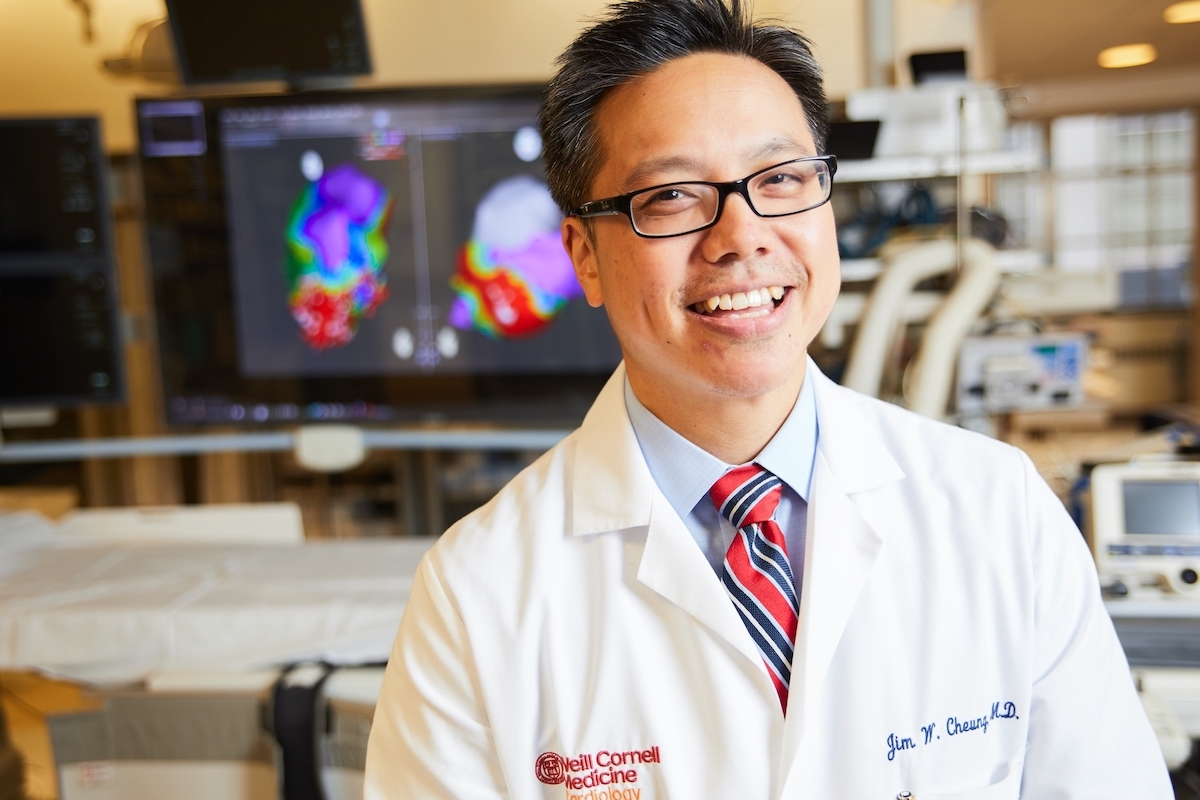
Dr. Jim Cheung. Photo credit: Travis Curry
Dr. Jim Cheung is an associate professor of medicine and director of the Clinical Cardiac Electrophysiology Fellowship Program. He lives in Manhattan with his wife and two children.
Tell me about your childhood.
I am a true local — I was born and raised in Jackson Heights, Queens. My parents were working-class immigrants from Hong Kong. My father worked in the restaurant business for years. My mother worked at home, sewing dresses by order all day and night, before moving on to become a manager at a garment factory.
Although they were extraordinarily busy, my parents took the time to emphasize the importance of education and curiosity. Growing up in a very diverse neighborhood, I was exposed to many different cultures at a young age. I did not have a chance to play baseball or soccer, but I did spend inordinate amounts of time in the local parks playing handball.
One of my great early mentors was a professor of mathematics at Ohio State University, Dr. Arnold Ross, who ran a math summer camp for high school students (he was 90 years old at the time). The motto of the program was "To Think Deeply of Simple Things," and it left quite an impression on me when I first heard it as a 14-year old. It has been a guiding mantra behind my current approach to thinking about my patients, about the questions I want to answer in my research and about the lessons I want to instill in my trainees.
When did you join Weill Cornell Medicine?
Weill Cornell Medicine has been a part of my life since 2002, when I completed my residency training at Massachusetts General Hospital. After completing my fellowship in cardiology and cardiac electrophysiology at NewYork-Presbyterian/Weill Cornell Medical Center in 2006, I returned to WCM in 2009, and it has been my home ever since.
What's your day-to-day life like as a cardiac electrophysiologist at WCM?
In the morning, we typically have a conference with our cardiac electrophysiology fellows where we discuss interesting cases, provide updates on current research or delve into recently published literature in our field. I then have a busy day in the electrophysiology (EP) lab, where I perform catheter ablation procedures or implant cardiac electronic devices to treat abnormal heart rhythms, known as arrhythmias.
Our ablation procedures can be complex and often take many hours. However, because we are 100% focused on tackling these challenging arrhythmias during the procedures, it's amazing how quickly the time passes. Electrophysiology is a field that demands not only knowledge and an ability to think on one's feet, but also a great deal of patience and perseverance.
Outside of the EP lab, I have a number of administrative responsibilities, which include overseeing the EP fellowship program and managing the EP research program as its director.
What's the most rewarding part of your job?
There are many tremendously rewarding aspects of my job. First and foremost is having the privilege of helping our patients. The level of satisfaction that comes with being able to eliminate or prevent a life-threatening arrhythmia and to improve the quality of the lives of those affected by debilitating arrhythmias is difficult to describe.
Second is being able to work with, and exchange ideas with, an extraordinary group of colleagues who share a common drive to help patients using the latest science and technology and to conduct important research that moves the field of cardiac electrophysiology forward.
Third is having the opportunity to serve as a mentor to young physicians whom we hope to develop into leaders in the field.
And the most challenging?
One of the most challenging aspects of my job is finding the right balance of time devoted to clinical, research and teaching responsibilities in addition to life outside of work.
What is your proudest moment at Weill Cornell Medicine?
There have been two proud moments—one was when I received a birth announcement from a patient for whom I performed an ablation procedure while she was in her first trimester of pregnancy and having rapid arrhythmias.
The other moment came from taking care of a young patient who had a form of life-threatening arrhythmia that was due to a genetic condition. We were able to trace the same arrhythmia condition to her mother and identified a novel mutation in a gene that codes for an ion channel that helps regulate electrical activity in cardiac cells. Working closely with the patient and her family to figure out this puzzle, I got to know them well on a personal level. Now we have embarked on an international collaboration to help unlock some of the mysteries of this rare condition. This represents a true patient–doctor collaboration that we hope culminates in a "bedside-to-bench-to-bedside" story that leads to a novel treatment.
What do you like to do when you're not at work?
I enjoy laughing with my wife and children, coaching my daughter's soccer team, trying to recreate '80s New Wave and '90s Britpop music with my electric guitar, and running.
What are your favorite things to do in NYC?
I enjoy trying new restaurants, catching concerts and running in Central Park.
What's on your bucket list?
I would love to travel to Tibet, attend baseball spring training camp and learn to play guitar like Johnny Marr.